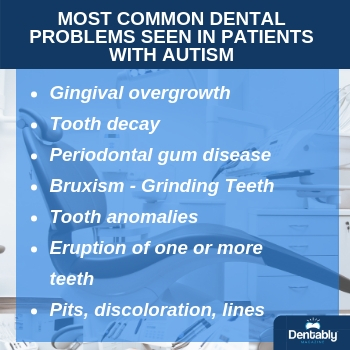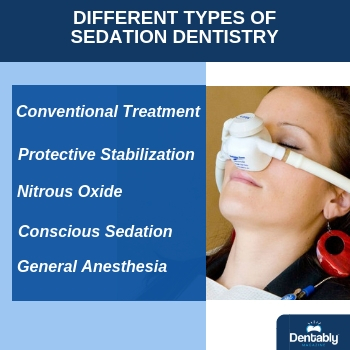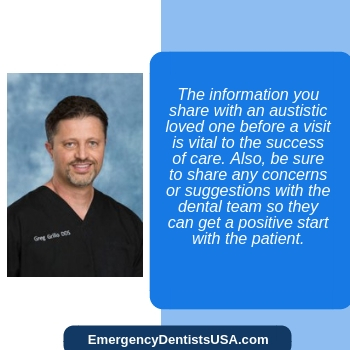Autism and Dental Care – A Guide For Their Oral Treatment was originally published by Dentably and can be found here
Going to the dentist can be a cause for anxiety for most of us, but it’s a very different feeling for those with autism. Our dental experts Dr. Greg Grillo and Dr. David Hudnall have spent countless hours helping patients and caregivers prepare for upcoming dental visits as well as helping them with tips and techniques that ensure proper oral health habits in the future.
Patients with special needs often have difficulty staying still and allowing the dentist to do what’s needed, which is why a loved one should always be present. Everyone needs a “figurative” hand to hold sometimes, especially those who fear the dentist, and it’s no different for patients with autism.

“Everyone deserves the best dental experience possible. Teams that are trained to work with special needs patients have the training and extra dose of compassion. These resources are a great place to start.”
Hablas Español? También tenemos este artículo aquí en Espanol, (Spanish).
Table of Contents
- Autism and Dental Care | Printable Resources
- The Most Common Dental Problems Seen in Patients With Autism
- What You And Your Dentist Can Do Together
- Talk to Prospective Dentists About Your Concerns
- How to Help at the Dentist
- Making the Necessary Preparations Before the Visit
- Sedation Can Be Beneficial
- Finding the Proper Dentist
- Additional Needs Dentists
- Asking Your Friends and Family for Suggestions
- Asking Your Doctor
- Equipment Requirements That Are Needed
- Advocacy Organizations Are a Huge Help
- Dental Insurance and Your Options
- Bring Something Familiar
- Possible Split Treatments
- What Can be Done at Home for Oral Health
- Brushing Their Teeth Regularly
- Give Flossing a Try
- Keep the Routine Regular
- Remember to Always Be Patient
- The Importance of Dental Care
- Conclusion
- Resources
Printable PDF Resources
Autism and Dental Care – This printable PDF is an excellent guide for you to be able to share all the information we have collected on this page!
Questions to Ask Your Dentist Before an Appointment – Dr. Greg Grillo compiled a list of useful questions that you can print and take with you when you meet with prospective dentists.
The Most Common Dental Problems Seen in Patients With Autism
Poor oral health is not always brought on or indicated through patients with autism, but proper oral health can be a problem in some cases. Some dental problems that are seen in patients can be purely genetic, but often times it’s not chalked up all that easily.
Patients sometimes struggle with oral hygiene, both the dentist and at home, so the proper amount of care can be difficult. For example, periodontal disease and cavities are the two most common dental problems that are often seen.

Listed below are other examples of common dental problems that patients with autism are more prone to:
- Gingival overgrowth
- Early and late tooth decay
- Severe, early periodontal gum disease
- The habit of constantly grinding their teeth, which is also known as “bruxism”
- Tooth anomalies that are related to the size, shape, and the number of teeth present
- Accelerated, inconsistent, and/or delayed eruption of one or more teeth
- Pits, discoloration, lines, and other developmental defects that are seen in teeth
Depending on how severe the autism is, a lot of patients will have difficulty communicating their pain. This results in dental health issues becoming so advanced that general anesthesia is not just required to help them relax, but is necessary due to the pain and procedure they will need. Some dental issues may require oral surgery, Emergency Dentists USA has a directory with a list of oral surgeons to find the best one for your child’s needs.

“Patients affected significantly with autism or other conditions that cause the patient to have difficulty with cooperation during dental treatment are many times better served by seeing a Pediatric Dentist. Pediatric Dentists have received additional training beyond dental school and have the experience to help patients with special needs receive necessary dental treatment while minimizing fear. They also have the ability to use sedation and even perform treatment in a hospital setting if needed.”
What You And Your Dentist Can Do Together
Patients with autism, especially children, have extreme sensory and oral motor integration issues, and the dentist can be a very frightful experience. All of the tools, noise, and people can easily stress a patient out and make them impossible to work on, and a lot of dentists will suggest a sedative right away.
A lot of patients with autism have a general fear of the dentist because it overrides their senses and is a lot for them to process in such a short time. Finding a dentist who knows and understands their fears by working with multiple special needs patients previously, is the best way to help them slowly overcome their fear.
Talk to Prospective Dentists About Your Concerns
Talking to prospective dentists is the best thing you can do to make the visit easier for someone who has autism. A well trained and comfortable dentist makes the process easier for everyone and is better able to anticipate and understand the needs of these patients.
This is not always easy though, as studies show upwards of 60% of dentists do not feel prepared to treat patients with additional needs. This is a staggering amount, and shows that not all dentists will be a good fit for a child with autism. The same study showed that the quality of education was a large factor in preparedness during the dentist’s career.
Thankfully, many dental programs have begun providing additional training materials about dealing with special needs patients. This includes the rise of internet programs, which are helping to change the perception on a wide range of needs including those of patients with autism. This should hopefully make a wider range of dentists more comfortable practicing on those who have them.
How to Help at the Dentist
There are ways you can help your loved one feel safe and secure while at the dentist. For example, if you are a parent of a young child who has autism, do not bring them to multiple offices. Instead, find one dentist that is understanding and will work with you and your child to keep their oral health in top shape. This eliminates the anxiety that they would have by going to different places each time.
Making the Necessary Preparations Before the Visit
For children and adults alike, you can also take the necessary steps to prepare them for their visit. Take them for a tour by showing them the website, telling them about the dentist they will be seeing. You can also tell them about your experiences at the dentist, even if it’s not the same one, and say that you feel much better after you went.

Sedation Can Be Beneficial
However, sometimes sedation is necessary to ensure they are getting the proper care that they need for their oral health. This is typical because patients with autism can be extremely difficult and uncooperative, and sedation is the only way to get whatever problem may be fixed.
A lot of people have concerns about this because they do not feel that sedation is safe, but it’s often the only way for patients to receive the care they need. This is typical because a lot of patients with autism do not like anyone touching their teeth or putting things in their mouth.
Sedation dentistry is actually very popular, even if the patient does not have any form of a special need. Sedation dentistry, also known as “sleep dentistry”, is used to give patients peace of mind and help them to relax while they are in the chair. Keep in mind that this is not the same thing as having a patient under anesthesia. Sedation dentistry keeps the patient somewhat awake and does not cause them to go to sleep completely.
One of the most common methods for dental sedation is nitrous oxide, sometimes known as laughing gas. This is the least invasive method that is safe for children. You can use our services to find dentists that use nitrous oxide near you.
In this type of situation, you can ask your dentist about seeing a specialist who can give you all of the information you’ll need. Oral sedation dentistry may be the best option you’ve got if you know for a fact that your loved one may refuse the treatment that they need.
Finding the Proper Dentist
Letting the dentist know that your loved one has autism is the first step. If they know and are not able to take them on themselves, they will be able to find someone who can for you long before the appointment, so ensure that you make the office aware well before the appointment.
Additional Needs Dentists
Dentists who only care for patients with special needs are typically hard to find, but they are out there. These dentists require an additional three years of dental postgraduate training. If you find one, you should definitely stick with this dentist, because they are the best option. Special needs dentistry is real, so ask your local dentist office if they have any information that could help you in finding one.
Asking Your Friends and Family for Suggestions
Speaking with a friend or family member who also has a loved one with special needs in their direct care is a great way to see about the perfect dentist. Do not just book an appointment based on what they have told you, but instead do some additional research yourself to see whether or not they are what you are looking for in a dentist.
Asking Your Doctor
Even though your doctor is nowhere near being a dentist, asking him or her is one of the best ways to find the best dentist. They may know someone who is best for the job because a lot of dentists work closely with doctors that have patients who have neurological conditions, such as epilepsy and cerebral palsy.
Equipment Requirements That Are Needed
If the patient uses a wheelchair, ensure that you are choosing a dental clinic that can accommodate this and any other requirements that they may have. Even though this is a regular standard to you, it may not be such a regular requirement for a dental office, so make sure to ask these questions before you book your appointment. The last thing you want is to bring them to their appointment and then find out they will not be able to treat him or her because of the lack of needed equipment.
Advocacy Organizations Are a Huge Help
If there are special needs advocacy organizations within your area that you can speak to about this, definitely do so. They will be able to point you in the right direction for dentists that have experience and can properly care for special needs patients. Some dentists may refuse to take on patients with special needs because of the difficulty, so asking an advocacy organization is a great way to get a straight answer and be pointed in the right direction.
Dental Insurance and Your Options
If you have your loved one on your dental insurance, call the company you are with and inquire about any special needs dentists they may be able to recommend based on your dental insurance policy. You may be lucky and find out that a special needs dentist is covered under your policy.
Bring Something Familiar
If the patient is a child, consider bringing their favorite toy. If they are older, think of something else to bring, such as their favorite book. Either way, bringing something they love and are familiar with is a great way to ease the tension and anxiety.
Possible Split Treatments
If they simply cannot relax during a cleaning or any other procedure, but there is more to come, consider splitting the treatments. If you’re at a special needs dentist specifically, they will more than likely offer this solution.
Instead of doing a number of treatments in one go, a lot of dentists will accommodate special needs patients and split them up over a short or long period of time. However, it all depends on the severity of the case and what needs to be done.
What Can be Done at Home for Oral Health
Caring for your loved one’s oral health is extremely important for their overall health. If they have poor oral hygiene it can lead to multiple issues, such as decaying teeth and loss of bone structure in the jaw. Therefore, taking the necessary steps at home to ensure that visits to the dentist are minimal.
Brushing Their Teeth Regularly
You should be brushing their teeth twice a day for two minutes minimum each time. Always angle the brush 45 degrees to the line of the gums while brushing the soft tissues and the base of the teeth. For the surface of the teeth brush in a circular motion up and down, and avoid horizontal strokes that are too harsh.
If they are not accustomed to brushing their teeth regularly this is going to be tricky to do, especially if they are a child. Brush your teeth with them, or do it by yourself at first, to show them that it’s important and a regular thing. You need to show them that this is something they have to do and that it’s very easy.
Give Flossing a Try
Flossing may be extremely difficult to do but it’s worth giving it a try. For children in general, you need to wait to start flossing when the teeth are all properly touching, for adults it doesn’t matter what stage you do it at.
Start by getting your loved one familiar with dental floss and then show them how it works. You may not be able to do it for them for quite some time, but incorporate it into the entire routine just so they know that it’s very important for proper oral health.
Keep the Routine Regular
Always ensure that you make and stick to an oral health care routine. Even if they have yet to fully participate in the oral care routine it’s very important that you yourself stick to it. Eventually, they will want to do everything that you are doing and may even let you start with mouthwash, too.
As long as they see you keeping up with your oral health, especially after you are constantly telling them how important proper oral hygiene really is, you’d be surprised how enthusiastic they could become.
Remember to Always Be Patient
It may take some time to get used to everything, so remember to be patient and keep in mind that all your hard work to help them will pay off in the end. Staying calm and being patient is easier said than done but those with special needs require just that. This will be very frustrating for both of you, no doubt.
The Importance of Dental Care
Archibald Cantor Brechin (Archie) is a New-Jersey based Autistic self-advocate and outreach associate at the Global Autism Project. As a self-advocate, Archie has spoken around the country and is currently an appointee to the Autism Society of America’s panel of individuals on the spectrum. He works with others in how they can reach their potential and live the highest quality life possible with dental and health care playing a key role.

“Dental care can be a painful and daunting experience for any child. Being poked and prodded by strange pointy objects is an ordeal for anyone but hypersensitivity to external stimuli that many children with autism experience certainly exacerbates the situation. I remember as a young child being pleasantly surprised when what at first seemed like fun. Even today the incessant scraping, drilling, plying and prodding triggers semi-traumatic memories of sensory overkill.
However, regardless of my own personal experience, I stand firm by my conviction that every child, regardless of any neuro-developmental or psychiatric diagnosis deserves the requisite dental care to lead happy, fulfilling, and productive lives with minimal medical complications. As many practitioners have dutifully noted, children on the spectrum are at greater risk for dental complications due to behavioral challenges or a limited diet of sugar and carbohydrates.
Therefore it is imperative for all. I implore service providers not to mistake a child’s discomfort or apprehension as noncompliance or disrespect but to be observant, compassionate, and understanding stewards of dentistry. Perform routine and specialty procedures in a way that minimizes harm and increases the ability of a child to exercise age-appropriate autonomy.”
Conclusion
Helping your loved one, whether they have autism or another form of special needs, with their oral health is extremely important to everything else that they need. Visiting the dentist and practicing proper oral hygiene on a daily basis is an important part of regular life, so ensure that you guide and show them what they need to do and help them further along the way. Luckily, there are ways to find a dentist for autistic patients and we are here to help.

“The information you share with a patient who has autism before a visit is vital to the success of care. Also, be sure to share any concerns or suggestions with the dental team so they can get a positive start with the patient.”
Resources
http://www.circleofmoms.com/autismaspergerspdd-awareness/taking-an-autistic-child-to-the-dentist-485809
This website is a great resource for moms who want advice and guidance from other moms. It has multiple forums that are very helpful for answering questions on important topics regarding their children.
https://www.mykoolsmiles.com/content/dentists-for-children-with-special-needs
This is a guide on how to find a dentist that specifically treats patients with special needs. It’s great for parents who want someone who solely deals with these types of patients to have and refer to whenever necessary.
http://www.friendshipcircle.org/blog/2012/05/16/a-special-needs-guide-to-dental-hygiene-for-children/
Even though it says it’s for tips on special needs kids, it’s good for both kids and adults depending on the circumstances. It relates to things you can do for generally all ages and is relevant for multiple situations and medical standards.
Finding a Dentist for Patients with Special Needs or finding a dentist for Patients with Autism.
Local directory and service for finding a dentist in your local community who specializes in serving patients with special needs. There are a very limited number of dentists who truly do have the experience needed to help in this way.
http://www.asha.org/About/news/Press-Releases/2015/Autism-Awareness-Month-Dental-Care-Tips/
This guide is great for parents of children with autism. It can also be helpful for adults with autism, as well. It has very helpful tips on starting and maintaining a routine oral health regimen.
Editor’s note
For our readers in the UK, the article in the link below about dental charges might be of interest
https://www.dentaly.org/en/dental-charges-uk-report/
________________________________________________
If you need help looking for services for an individual with an autism spectrum condition, we will do our best to help. Click below for the Autism Placement Support Service.




